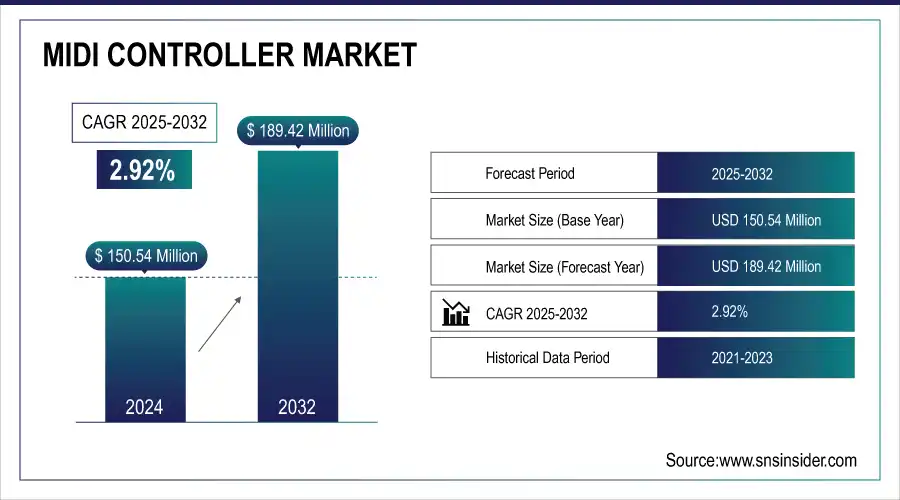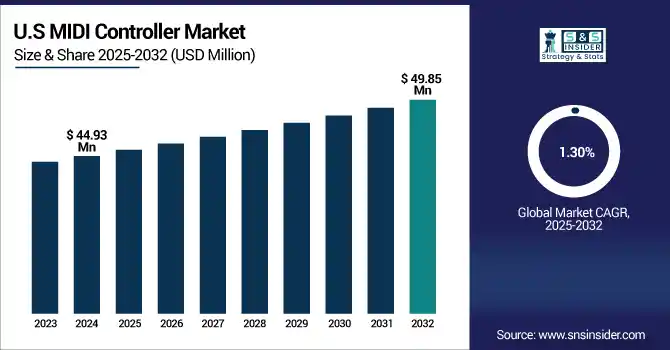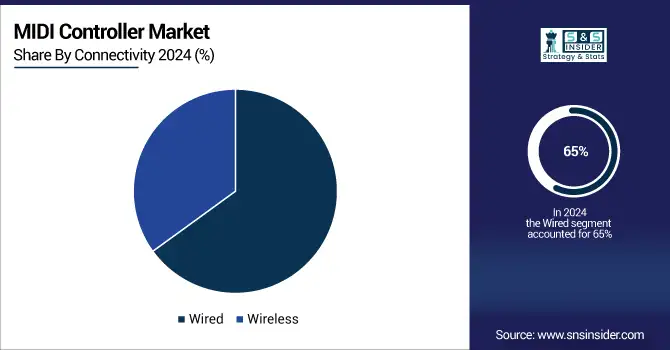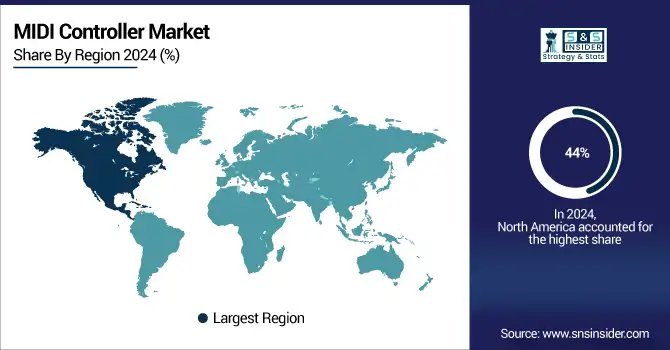MIDI Controller Market Report Scope and Overview:
The MIDI Controller Market Size was valued at USD 154.94 Million in 2025E and is expected to reach USD 195.05 Million by 2033 and grow at a CAGR of 2.92% over the forecast period 2026-2033.
Rapidly growing popularity of digital music production tools results in continuous MIDI Controller Market growth of demand for compact, ergonomic and convenient devices to handle them. Indie musicians and content creators are setting up home studios in force, and these players have really driven demand for MIDI controllers with tight integration for their digital audio workstations (DAWs). Additional connectivity options including USB and wireless, and touch sensitive controls and user customizable button mapping make these devices popular with novice and professional users alike. The growing trend of live performance with electronic instruments and mobile musical production is also helping to usher in a new wave of compact, portable controllers. All of which adds up to a dynamic market with a growing range of uses for music production, live performance, and creative exploration.
ESI releases XSynth: the all-in-one digital synthesizer, poly aftertouch MIDI controller and USB audio interface is now available for €369, April 30th, 2020 Berlin (Germany).

To Get More Information On MIDI Controller Market - Request Free Sample Report
MIDI Controller Market Size and Forecast:
-
Market Size in 2025E: USD 154.94 Million
-
Market Size by 2033: USD 195.05 Million
-
CAGR: 2.92% (2026–2033)
-
Base Year: 2025E
-
Forecast Period: 2026–2033
-
Historical Data: 2022–2024
MIDI Controller Market Highlights:
-
Rising live performance demand is accelerating the adoption of advanced MIDI controllers, driven by artists seeking hybrid hardware–software tools with real-time control, macro mapping, and clock synchronization.
-
Growth of DAW-less and modular setups is increasing demand for standalone, compact, and durable MIDI control hubs that support plug-and-play live workflows.
-
Product innovations for live use, such as snapshot-based control, beat-synced triggers, CV I/O, and deep DAW integration (e.g., Neuzeit Instruments’ DROP), are expanding creative possibilities for complex performance setups.
-
Slower innovation cycles remain a key restraint, as incremental upgrades and cosmetic changes reduce user motivation to replace or upgrade existing MIDI controllers.
-
Open ecosystem compatibility presents a major opportunity, enabling seamless integration across multiple software platforms and appealing to a broader user base from beginners to professionals.
-
Strategic partnerships and ecosystem expansion, such as Native Instruments collaborating with Akai, Korg, and Novation to extend NKS integration, are enhancing interoperability and driving wider market adoption.
The U.S MIDI Controller Market size was valued at USD 45.51 Million in 2025E and is projected to reach USD 50.47 Million, growing at a CAGR of 1.30% during 2026-2033, due to growing adoption of electronic music production, increasing demand for live performance tools and maturity of MIDI controller including combination with DAWs and modular synthesizers. NIMBUS Compact, feature packed controllers that are taking the world by storm Real-time control of your DAW and software instruments is easier than ever before with Nektar's new line of Impact LX+ USB MIDI controllers.

MIDI Controller Market Drivers:
-
Surge in Live Performance Needs Fuels Evolution of MIDI Controller Technology
The MIDI controller market keeps on growing fueled by increased demand for dynamic live performance tools and hybrid studio control kits. More and more artists are looking for hybrid gear that fuses hardware with software. Features, such as snapshot capability, macro mapping and clock synchronization, are enhancing creative possibilities and the accessibility of live data in live setups. The growing popularity of DAWless setups and performance based hardware synth usage is also spurring demand for standalone MIDI control centers. Small but mighty designs, durable construction, and plug-and-play integration are starting to be must-have features. With live electronic music and modular gear becoming ever more popular, the market is poised to grow and evolve quickly in the coming years.
Neuzeit Instruments introduces DROP a robust snapshot-based MIDI hub designed for live and complex setups Neuzeit Instruments DROP is a robust and snapshot based MIDI hub that is a true workhorse for your live performance and complicated setups. Featuring Macro Mapping, Beat Sync'ed Triggers, CV I/O and Ableton Live integration, DROP makes its Superbooth 2025 debut.
MIDI Controller Market Restraints:
-
Slower Innovation Cycles Reduce Consumer Motivation to Upgrade MIDI Controllers
The MIDI controller market faces a significant restraint due to slower innovation cycles, where product updates often offer only minor feature enhancements rather than transformative improvements. Many new models release with cosmetic upgrades or slightly refined control layouts, lacking major innovations in user interface, AI integration, or connectivity. As a result, existing users, especially professionals and prosumers, see little incentive to replace or upgrade their current equipment. This stagnation diminishes consumer enthusiasm, weakens brand differentiation, and hampers overall market expansion. Moreover, in an era where rapid tech evolution is expected, the lack of disruptive advancements in MIDI controller design leads to a perception of obsolescence, particularly among tech-savvy creators and early adopters.
MIDI Controller Market Opportunities:
-
Open Ecosystem Compatibility Fuels Wider MIDI Controller Adoption
As MIDI controllers increasingly adopt open ecosystem compatibility, the market is witnessing new growth opportunities. By enabling seamless integration with a variety of software platforms, these controllers eliminate user dependency on brand-specific tools, promoting flexibility and creative freedom. This broader compatibility appeals to a wider range of users, from beginners to professionals, driving higher adoption rates across diverse music production setups. As more consumers seek versatile and future-proof equipment, brands that offer cross-platform functionality can attract new segments, improve customer retention, and differentiate themselves in a competitive landscape. Ultimately, open system design not only enhances the user experience but also catalyzes innovation and market expansion in the MIDI controller industry.
Native Instruments Teams Up with Akai, Korg & Novation to Extend NKS Integration Native Instruments has announced a partnership aimed at providing an enriched user experience for its players, through its long-term collaboration with like-minded music-making machines to create a unified creative ecosystem, ultimately enabling new potential for all artists.
MIDI Controller Market Segment Analysis:
By Pad
The Keyboard Controllers segment held a dominant MIDI controller Market share of around 60% in 2025E, and is a popular choice of instrument among musicians as they can be used in combination with other DAWs and virtual instruments. They offer a piano-like playing experience, the ability to play samples and control software functions, so it is easy to see why they are a favorite with beginners and professionals, ensuring that they're always in demand for both studio and performance situations.
The Pad Controllers segment is expected to experience the fastest growth in the MIDI controller Market over 2026-2033 with a CAGR of 5.07%. This growth is fueled by increasing the popularity of finger-drumming, beat-making, and live performance uses. Some of the reasons why electronic music and hip-hop musicians around the world like their small form factor, responsive touch, and tight integration with music production software.
By Connectivity
The Wired segment held a dominant MIDI controller Market share of around 65% in 2025E, owing to reliable connectivity, low latency, and compatibility with a variety of professional audio devices. They are a popular choice in any studio or live environment where reliable, unbroken data is essential, which is why many music makers turn to wired controllers.
The Wireless segment is expected to experience the fastest growth in the MIDI controller Market over 2026-2033 with a CAGR of 4.20%, driven by the growing need for mobile and uncluttered music making solutions. The maturity of Bluetooth and low-latency wireless has the potential to optimize the user experience across mobile devices, making wireless MIDI controllers increasingly appealing to mobile musicians, home studio musicians, and artists who demand freedom from their performance and session setups.

By End-User
The Music Production segment held a dominant MIDI controller Market share of around 58% in 2025E, owing to surge in home studios, digital audio workstations (DAWs), and independent music creation. Increasing availability of music production software and online tutorials allows artists to create their own professional tracks at home, creating the need for MIDI controllers as critical tools to create, edit, and arrange music.
The Live Performance segment is expected to experience the fastest growth in the MIDI controller market over 2026-2033 with a CAGR of 4.15%, as a result of the increasing need for portable, real-time control devices among DJs and performers. Performance creativity is elevated through interaction between MIDI controllers, stage lighting, sound effects and loopers, leading to larger application in live music scenes.
MIDI Controller Market Regional Analysis:
North America MIDI Controller Market Trends:
In 2025E, North America dominated the MIDI controller market and accounted for 44% of revenue share, sound presence of music production studios, high adoption rate of digital audio workstations (DAWs), and strong demand from professional musicians and content creators. The excellent technical infrastructure and increasing interest in electronic music production in the area continue to underline the market position.
The MIDI controller market in the U.S. is growing on the back of increasing demand for high- which creates a growing demand for better user interface experience and more accurate control in music production or other performance applications, and is driving the growth of this market in the U.S.
Asia-Pacific MIDI Controller Market Trends:
Asia-Pacific is projected to register the fastest CAGR of 4.09% during 2026-2033, driven by rising adoption of digital music tools, increasing smartphone and tablet penetration, and growing interest in home-based music production. Expanding youth population, technological advancements, and supportive government initiatives in countries including China, India, and Japan further boost regional growth.
Europe MIDI Controller Market Trends:
In 2025E, Europe emerged as a promising region in the MIDI controller market, because of growing use of digital music tools, expanding smartphone and tablet users, and surging popularity of home-based music production. Increasing number of youthful population, technological adoption and favorable government initiatives in economies such as China, India and Japan is likely to drive the regional growth.
Latin America and Middle East & AfricaMIDI Controller Market Trends:
LATAM and MEA is experiencing steady growth in the MIDI controller market, is growing at a steady rate because of growing urban population, growing inclination of people toward digital music creation and increasing access to low cost music production tools in these regions. Rising demography of youth, trends in music streaming, and local music content production are also driving the demand, making these regions the prospective markets to expand by the market players.

Get Customized Report as Per Your Business Requirement - Enquiry Now
MIDI Controller Market Competitive Landscape:
Novation Established in 1992, is a UK-based music technology company specializing in MIDI controllers, synthesizers, and music-production hardware. Known for innovation and user-friendly design, Novation serves electronic musicians, producers, and DJs worldwide, offering products that integrate seamlessly with digital audio workstations and modern studio environments.
-
In Nov 2024, Novation Launchkey MK4 Earns Praise as Top Budget MIDI Controller for Ableton UsersWith standout features like advanced arpeggiator and Chord Map mode, the Launchkey MK4 cements its place as a leading choice under USD 300.
Korg Established in 1962, is a Japan-based musical instrument and music technology company renowned for synthesizers, keyboards, digital pianos, tuners, and audio equipment. Korg is recognized globally for technological innovation, sound quality, and products widely used by musicians, composers, and producers across genres.
-
In Nov 2024, Korg has launched the nanoKEY Fold, an ultra-compact, foldable MIDI keyboard designed for mobile musicians, featuring 25 membrane keys, 15 built-in scales, and a smart arpeggiator. Its smartphone-sized form factor and touch sliders make it ideal for on-the-go music creation.
MIDI Controller Market Key Players:
-
Akai Professional (inMusic Brands)
-
Novation
-
Native Instruments
-
Korg Inc.
-
Roland Corporation
-
Ableton
-
Arturia
-
M-Audio (inMusic Brands)
-
Alesis (inMusic Brands)
-
Behringer (Music Tribe)
-
Yamaha Corporation
-
Nektar Technology
-
IK Multimedia
-
Studiologic (Fatar)
-
Samson Technologies
-
CME Pr
-
Pioneer DJ
-
Keith McMillen Instruments
-
Teenage Engineering
-
ESI Audiotechnik (XSynth)
| Report Attributes | Details |
|---|---|
| Market Size in 2025E | USD 154.94 Million |
| Market Size by 2033 | USD 195.05 Million |
| CAGR | CAGR of 2.92% From 2026 to 2033 |
| Base Year | 2025E |
| Forecast Period | 2026-2033 |
| Historical Data | 2022-2024 |
| Report Scope & Coverage | Market Size, Segments Analysis, Competitive Landscape, Regional Analysis, DROC & SWOT Analysis, Forecast Outlook |
| Key Segments | •Pad (Pad Controllers, Keyboard Controllers, Others) • Connectivity (Wired, Wireless) • End-User (Music Production, Live Performance, Others) |
| Regional Analysis/Coverage | North America (US, Canada), Europe (Germany, UK, France, Italy, Spain, Russia, Poland, Rest of Europe), Asia Pacific (China, India, Japan, South Korea, Australia, ASEAN Countries, Rest of Asia Pacific), Middle East & Africa (UAE, Saudi Arabia, Qatar, South Africa, Rest of Middle East & Africa), Latin America (Brazil, Argentina, Mexico, Colombia, Rest of Latin America). |
| Company Profiles | Akai Professional (inMusic Brands), Novation, Native Instruments, Korg Inc., Roland Corporation, Ableton, Arturia, M-Audio (inMusic Brands), Alesis (inMusic Brands), Behringer (Music Tribe), Yamaha Corporation, Nektar Technology, IK Multimedia, Studiologic (Fatar), Samson Technologies, CME Pro, Pioneer DJ, Keith McMillen Instruments, Teenage Engineering, ESI Audiotechnik (XSynth). |

